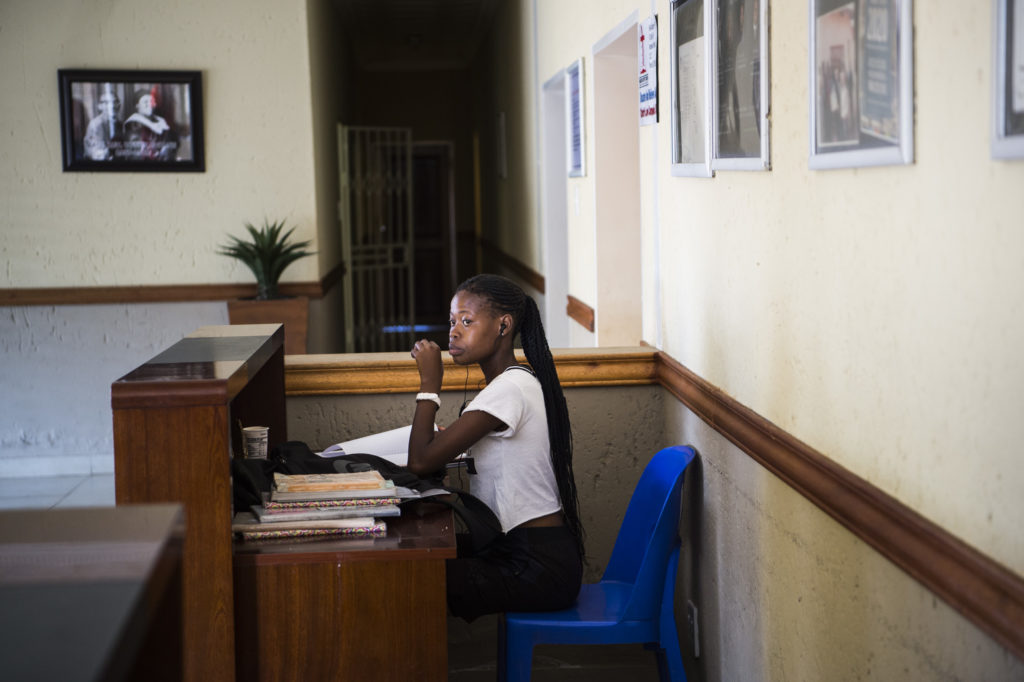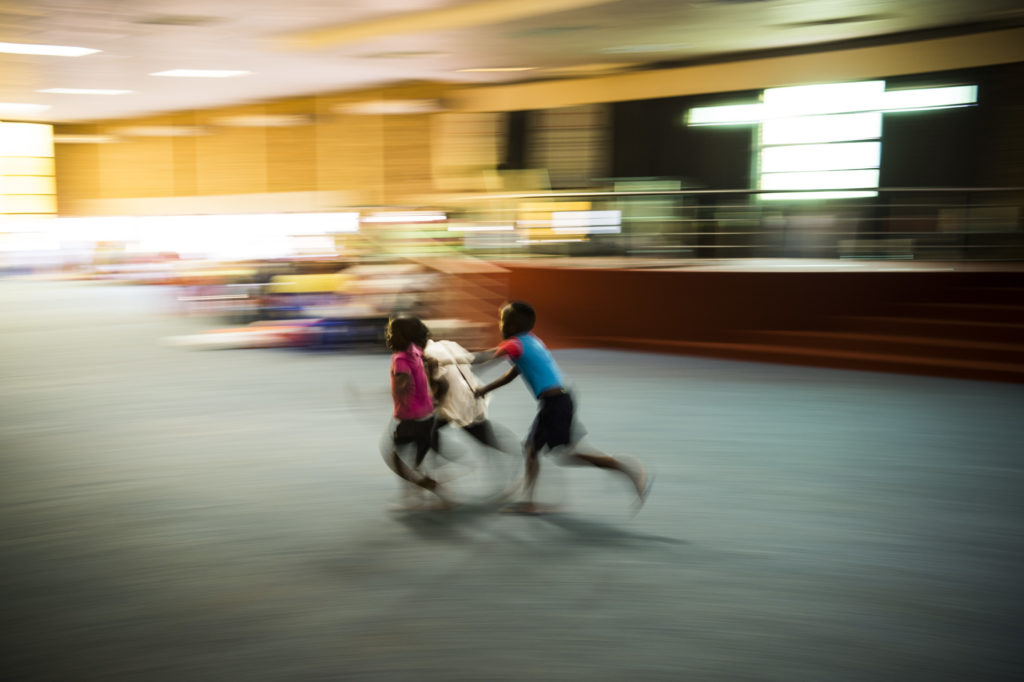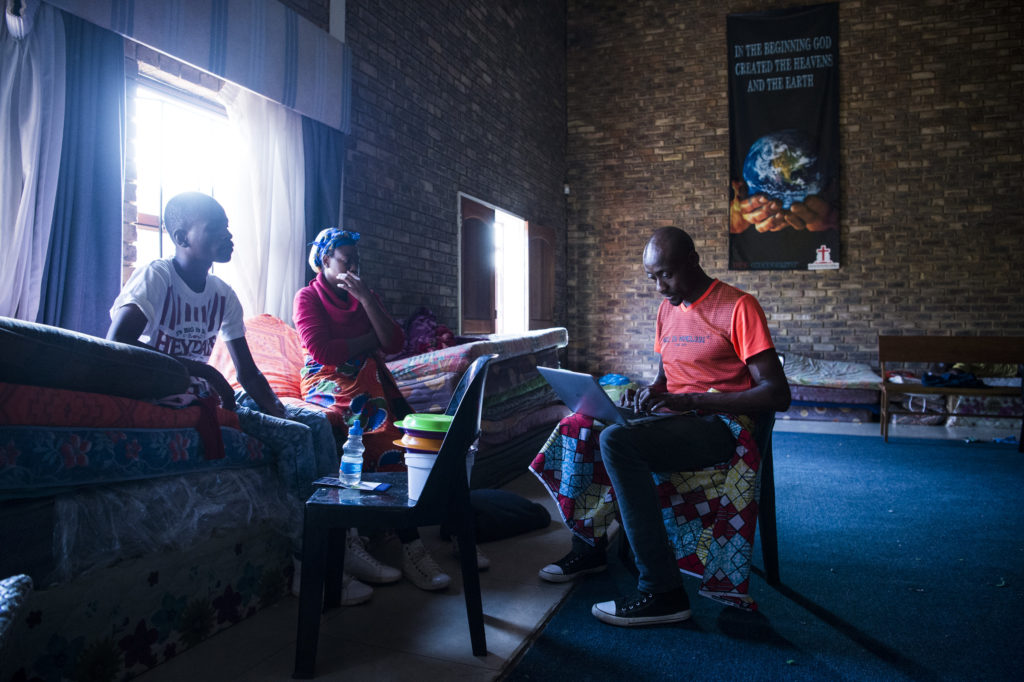Living in limbo: 180 people have been living in the Mamelodi Baptist Church since December. (Delwyn Verasamy/M&G)
It is a hot Tuesday afternoon in Mamelodi, Pretoria.
The yard of the Mamelodi Baptist Church is a hive of activity. A group of men sit under a tree. On the other end of the yard a group of women sit around another woman whose hair is being braided. White, yellow and blue school shirts have been hung to dry on the fence.
Inside the church there are mattresses crammed into every corner.
In the middle of the church, next to the pulpit, a girl sits at a table that is covered with a white cloth. She is doing her homework, surrounded by a group of younger girls. They keep asking her questions, while some point at her book. Each intervention is a distraction, but she is persistent.
In the entrance of the church, another young girl sits with her books, doing her homework. Earphones are her way of drowning out the noise coming from the toddlers running around, screaming and playing.
It is living in this kind of environment, with its constant noise, no privacy and a bunch of strangers that reduces 16-year-old Ntando* to tears when she talks to the Mail & Guardian about her experience.
 A learner tries to study, despite the background noise. (Delwyn Verasamy/M&G)
A learner tries to study, despite the background noise. (Delwyn Verasamy/M&G)
Ntando, together with about 400 people, moved to the church in December after their shacks in different informal settlements in Mamelodi were swept away by sudden, devastating floods.
The grade 10 learner says all she wants is her life back. She misses her friends. She misses being able to do what she wants to do, and not what strangers want her to do. Tears flow down her cheeks for most of the interview. There is sadness in her eyes. She says she hates the politicians who have failed to fulfill the promises they have made.
“I hate it here: it’s boring. People never sleep early and there is always noise. I don’t feel free; there is no privacy, like, I cannot do anything. There is nothing nice about staying here; there is nothing interesting to do,” she says.
Ntando is also embarrassed at the prospect of her friends finding out that she stays at the church. “I don’t want my friends to know where I stay because I fear that even when I try to say something they might say I cannot say anything because I stay at Baptist.”
 Children running around playing at the baptist church. (Delwyn Verasamy/M&G)
Children running around playing at the baptist church. (Delwyn Verasamy/M&G)
Despite needing to focus on school, she says even small things, like taking a bath, are a struggle. Because there is no bathroom, she and other learners have to bathe inside the church’s toilets, using a washing basin. In the morning this means too many people are in too small a space.
“You sleep late and wake up early because of the noise. Your body never properly rests and sometimes I sleep in class. It’s been miserable.”
Ntando says she feels like a burden and that politicians do not treat her as a citizen of South Africa.
Days after the floods Gauteng Premier David Makhura said the Mamelodi flood victims — including those staying at Baptist Church — would be moved to a new area where they can rebuild their homes. He said this would happen before Christmas. But Christmas has come and gone.
However, Makhura’s spokesperson, Vuyo Mhaga, told the M&G this week that land had been secured but because of the challenges in the Tshwane council — which has to make transfers and adjust its budget to purchase the land — the process has stalled. “Council has been collapsing since December, so some of the decisions that we would have wanted to be carried through by the city have not been carried through purely,” he said.
Mhaga said Makhura has, in the meantime, asked Gauteng MEC for human settlements, urban planning and co-operative governance and traditional affairs Lebogang Maile to find alternative ways that can ensure that the land is secured. But learners staying in the church are unhappy about the way they have been treated. “I hate politicians. I feel like they are treating us as people who are not important in society and in life. They don’t treat us like other people because we are poor. They look down on us,” says Ntando.
At the other end of the church, four men sit watching videos on a phone. There are no televisions in the church so this is their one form of entertainment. Near the men a young girl and a toddler sleep on a mattress — a way of passing time.
Njabulo*, 13, who has started grade 8 at Mamelodi High School, says he is fine staying at the church but the one thing that frustrates him is the noise, which makes it difficult for him to study or sleep at night.
“I study outside because at least there it is not as noisy as inside the church. I have to study because I want to pass at school,” says Thabiso*, who moved into the church with his mother.
He wants politicians to move the families to new places, as they had promised. “That’s all that I want,” he says in a soft-spoken voice.
In almost every corner of the church, there is a chair with a school uniform hanging from it. Because they lost their uniforms in the flooding, children have just one uniform that they need to clean and hang up.
Nosipho*, 17, who just started grade 10 at J Kekana High School, did not expect that moving from Kwaggafontein in Mpumalanga to Gauteng would end up with her staying in a church.
She moved in December to live with her parents at 77 Buffer Lake informal settlement in Mamelodi. On the day of the flooding she was alone in the shack while her parents were at work. When the water began seeping inside, she tried moving it away with a broom. When this didn’t work, she went outside, in time to watch as the whole shack — her family’s only home — was lifted up and swept away. “All our belongings were swept away,” she says, crying.
Now, in the church, the constant noise and activity make studying difficult. And, because she is also embarrassed to live at a church with other people, she tells her friends that she takes the bus in from Kwaggafontein — 80km away — every day. When people see her at the church, she tells them that she’s visiting her mother.
Community leader Thulani Ndlovu said that many children staying at the church started going to school a week late because most of them did not have uniforms. The community went on local radio stations and used social media to ask for donations. School uniform donations are still coming in and some learners stand in a queue for trousers to be fitted.
 Learners try to study. Community leader Thulani Ndlovu (right) says people just want to rebuild their lives; and women cooking in the church. (Delwyn Verasamy/M&G)
Learners try to study. Community leader Thulani Ndlovu (right) says people just want to rebuild their lives; and women cooking in the church. (Delwyn Verasamy/M&G)
Ndlovu says after the floods about 450 people moved into the church; now 180 are left. “The government is not giving us feedback; they are dragging their feet … So people have lost hope and they went back to rebuilding their shacks even though the place is not safe.”
He says all the community wants is to be given land on which they can build their shacks, even if there is no water or sanitation. “We just want to rebuild our lives.”
- The M&G obtained permission from parents and learners for interviews, but decided to remove their names to protect their privacy